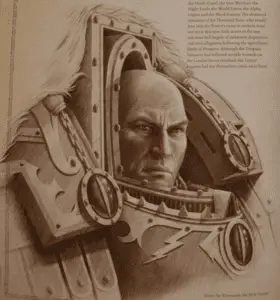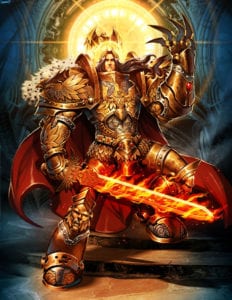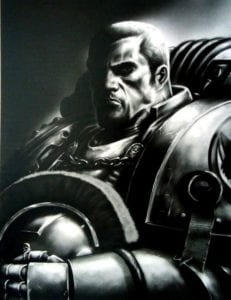Hello, readers of the Fandomentals. Today I bring you another story from the grimdark Warhammer 40K universe, after telling you about Dark Heresy and Helsreach. The tabletop game and the novel delve into the terrible place that is the galaxy in the 41st millennium. The books I will tell you about today delves into a major reason it got this way. Horus Rising, False Gods and Galaxy in Flames are the first three parts of the lengthy story of Horus Heresy.
A peculiarity of the books is that few people picking them up won’t know how they end. Most people who have had contact with the WH40K franchise know that the Emperor of Mankind is a rotting corpse on the Golden Throne after his traitorous son, Horus, mortally wounded him. It is something of an opening for the setting. This gives the books an air of a classical tragedy. We know, as we read them, that they’re heading for an inevitable disaster, but we read on to see the conflicts, struggles and triumphs of those who participated in those events.

The Great Crusade
Ten thousand years before the “present” timeline, the Emperor’s Great Crusade is in full swing. The Primarchs, his genetically-engineered sons, are leading the legions of Adeptus Astartes (Space Marines) to subjugate the galaxy and make it a home of humanity’s golden age. After a long era where the worlds humanity had conquered were separated from each other, the Emperor will bring them together.
If that sounds way too good to be true or just plain sketchy… well, it is. The Imperium isn’t the fascist theocratic nightmare it would become later on, but the seeds are there. The dogma that all alien species are inferior to humanity and must die would hardly be out of place in the preaching of Adeptus Ministorum. Human worlds face a simple choice: bow their heads to the Emperor or have the Astartes do it for them.
The first scenes of the book takes place on one such world, which the Marines subjugate. Or, as the Emperor would rather they call it, bring it to compliance. It’s swift and brutal. And afterwards, more than one person asks, why couldn’t they have just left them alone? The galaxy is a big place. There’s no satisfying answer to that. And it’s the first crack in Horus’s resolve.
Even though Horus Lupercal, Primarch of the Lunar Wolves and Warmaster of the Great Crusade, isn’t our main viewpoint character, he’s the lynchpin of the books. He’s one of the demigod warriors the Emperor has created using mysterious technology to lead his armies. His size is immense, his strength godlike, his charisma and intellect towering, and his political acumen hard to match.
None of this helps him much to shoulder the titanic weight of a pan-galactic war of conquest after the Emperor retires to Terra for vague reasons. Then he assigns councilors and bureaucrats to tax and administer the compliant planets. It galls Horus to have to listen to the ‘nattering of paper-pushers’, as he sees it.

The word I used above, “vague,” is the key here. We don’t actually see the Emperor in these three books. The only glimpse of him we get is in a vision, where he appears a radiant, majestic figure that enthralls others by mere vicinity. Apart from that, we only hear about him. But even while his servants talk about him with nothing but reverence, cracks show.
As you may know, in the 41st Millenium, the Emperor is worshipped as a god. But that wasn’t the case during the Great Crusade, during which he declared religion to be the bane of mankind and sought to eradicate it, replacing it with secular truth. Despite his immense power, he staunchly denied being a god. And yet… while claiming not to be a god, he very clearly has the failings of one. Chief of which being the belief that everyone should just do as he says with no question or doubt. He won’t tell his sons why he needs to go back to Terra… or much of anything, really. And it ends up being one of the breaking points of the rebellion against him.
The dramatis personae
Our main anchor in the galaxy is Garviel Loken. He’s a Space Marine serving in the Luna Wolves legion, which descends from the eponymous Horus. Like all Astartes, he’s a warrior and nothing else. His only goal is to fight and die for the Emperor.
Much like Helsreach, the Horus Heresy books show us why such characters aren’t necessarily boring or one-note. Garviel has the single-minded focus on war that all Astartes share, but he’s a surprisingly deep thinker. He questions things and has an unflinching devotion to truth. He won’t abide a comforting lie when the truth is available.
Garviel shares a bond of brotherhood with all the other Astartes, many of whom are his comrades in arms and some of whom are close friends. He also joins the Mournival, Horus’s unofficial court of advisers. It consist of four Marines of starkly different temperaments and its purpose is to give the Warmaster perspective.
That’s not all there is to it, however—we see Horus use them to say things he cannot say out loud. When the Luna Wolves arrive to salvage a mismanaged military operation by another expeditionary force, Horus lets the Mournival berate the commanders for the mistakes that had led there before stepping in as a conciliator. His political sense does match his strength.
There’s a strong spirit of camaraderie in the first book and part of the tragedy of the story is to see it weather and unravel. The Space Marines might seem a uniform fighting force, but where there are humans, there are different views and personalities. The Astartes might be nigh-immortal superhumans, but they are human nonetheless. They have their quirks, their convictions, friendships, and enmities. The same is true for Horus and the other godlike Primarchs. Thus, despite the titanic scope of the conflict, the tragedies and triumphs amidst all that feel real, human and grounded.

Aside from Astartes, however, one of the more interesting aspects of the books is the relationship between them and “mortal” humans. There are many who travel along the trail of the Great Crusade. Millions of human soldiers from the Imperial Army fight alongside the Astartes… and just as many civilian staff.
Of particular interest to us are Rememberancers. The Emperor had decreed that the Crusade has to be immortalized and that the Rememberancers would do it. They’re artists of all kinds—writers, poets, photographers, musicians. The Space Marines tend to treat them as an annoyance at the best of times and have little time to spare for them.
But as one might expect, they turn out to be much more important than that. The nature of their task means that it intertwines with several themes running through the book. Truth and whether or not it’s worth saying even if it’s ugly. The nature of war. The Emperor’s denial of everything spiritual and supernatural, which clashes badly with appearance of actual daemons.
It’s not really the only thing about it that’s questionable, of course. The Emperor’s imperial truth shares several traits that he condemns in religion. It quashes differing viewpoints and preaches one way of thinking. Religion isn’t just ousted, it’s simply forbidden.
It’s no coincidence, then, that during the course of the book we see the Imperial Cult spring up. What would eventually become the oppressive, violent state religion of the Imperium is a secretive cult for now, worshipping the Emperor as a god. Maybe it’s easier for people to go from one dogma to another.
Much of our insight into this comes from Garviel’s discussion with his mentor, Kyril Sindermann. He’s a mortal human and part of the corps of Iterators, who are in equal parts diplomats and propagandists, masters at manipulating the masses. The carrot to the Astartes’ rocket-propelled, fully-automatic explosive stick, they deliver the Imperial Truth to the people of the Imperium through honeyed words and careful orchestration of opinion. Sindermann’s lectures and discussions with Loken might seem innocuous at first but invariably end up relevant to the later conflict.
Amidst the drama and clashing ideals there’s the much more mundane reality of war. Since most of the characters we follow are warriors to the exclusion of all else, we’re going to see plenty of it. Despite the combatants being towering giants in power armor, the picture of the fighting is grim and bloody. The Space Marines prosecute war with grim certainty and there’s no real glory in it, just more death and violence.
The first three Horus Heresy books take a setting many of us will not think much of and give us a tense drama, sweeping conflict, and clashing ideas against the seemingly-silly backdrop of space marines in bulky armor. If you give them a try, you might just find something new.

